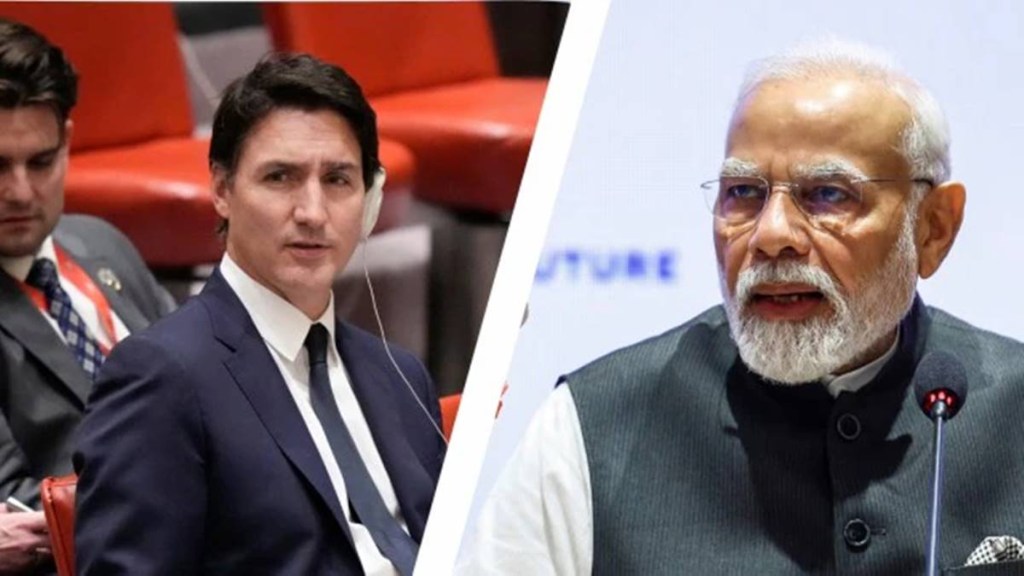India has firmly rejected the latest diplomatic communication from Canada, accusing Canadian Prime Minister Justin Trudeau’s government of making baseless imputations against Indian diplomats.
The Ministry of External Affairs (MEA) issued a strong statement on October 14, 2024, denouncing Canada’s suggestion that India’s High Commissioner and other diplomats are “persons of interest” in an ongoing investigation. This move, India asserts, is part of a calculated political strategy tied to Trudeau’s reliance on vote bank politics.
The Indian government characterized the allegations as preposterous, with the MEA stating, “We strongly reject these imputations, which are nothing more than a political ploy.” The statement highlighted that the Trudeau administration has not provided any evidence to support its claims despite numerous requests from India. “These baseless allegations appear to be part of a deliberate strategy to malign India for political gains,” the MEA stated, stressing that this latest step follows a pattern of Canadian actions that lack factual backing.
A Pattern of Political Opportunism
India’s rejection of these allegations follows a strained relationship between the two nations, particularly since Trudeau’s controversial accusations in September 2023. At that time, Trudeau alleged Indian involvement in the murder of a Canadian Sikh separatist leader, Hardeep Singh Nijjar, without presenting any substantive evidence. Since then, the Trudeau government has continued to advance claims that India views as unfounded and politically motivated.
India noted that Trudeau’s hostility toward the country is not new. In 2018, his visit to India, intended to secure votes from pro-separatist elements, backfired when members of his cabinet were exposed for their links to individuals promoting extremist ideologies. The MEA statement recalled these associations, pointing out that Trudeau’s government has persistently engaged with groups espousing anti-India separatist movements for narrow political ends.
India also criticized Trudeau’s interference in its internal affairs, particularly his stance on the farmers’ protests in December 2020, where he openly expressed support for protestors. “Such interference is consistent with Trudeau’s long-standing pattern of undermining India for political advantage at home,” the MEA remarked.
Allegations Timed for Political Gain
The timing of these fresh allegations is telling. Trudeau’s government has been under pressure for failing to address foreign interference in Canadian politics. By drawing India into the controversy, India believes that Trudeau is attempting to deflect criticism. The MEA statement linked this development to Trudeau’s scheduled appearance before a commission on foreign interference, underscoring the political motivations behind the diplomatic friction. “This is clearly an attempt to shift focus away from Canada’s own internal challenges,” the MEA said.
Moreover, India views the allegations as serving the interests of violent separatist elements operating within Canada. The Indian government has long expressed concern over the activities of Khalistani extremists who have found safe haven in the country. These groups have engaged in acts of intimidation, including issuing death threats against Indian diplomats and community leaders. India criticized the Canadian government’s inaction on this front, stating, “Under the guise of free speech, Canada has allowed violent extremists to threaten Indian interests.”
Diplomatic Fallout
The diplomatic fallout from these tensions has already led to a reduction in Canadian diplomatic representation in India. Citing the principle of reciprocity, India scaled down the size of the Canadian High Commission in New Delhi earlier this year. The MEA hinted that further steps could be taken in response to the latest developments, stating that India “reserves the right to take necessary measures” to counter these baseless accusations.
One of the key figures targeted by the Canadian government’s allegations is High Commissioner Sanjay Kumar Verma, a veteran diplomat with over 36 years of service. Verma has served in several high-profile roles, including ambassadorial postings in Japan and Sudan. The MEA dismissed the accusations against him as “ludicrous” and unworthy of serious consideration, calling them part of a broader smear campaign orchestrated by the Trudeau government.
A Call for Action, Not Words
India reiterated its stance that relations with Canada can only be repaired if the Trudeau government takes decisive action against those fostering anti-India activities on Canadian soil. The MEA’s statement made it clear that mere dialogue, without concrete steps to curb extremist groups, would not suffice. “India continues to expect that anti-India activities, including violent extremism and terrorism, will be curtailed in Canada,” the statement stressed.
Despite Trudeau’s recent comments in Vientiane, Laos, after meeting Indian Prime Minister Narendra Modi on the sidelines of the ASEAN-India Summit, Indian officials have downplayed any substantive progress in the talks. According to sources, “there was no substantive discussion” between the two leaders, as Trudeau had claimed. India remains firm that tangible action, rather than diplomatic rhetoric, is required to resolve the ongoing issues.

